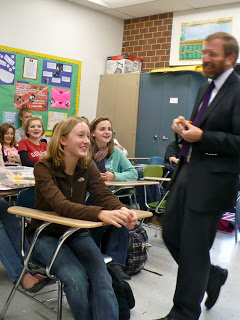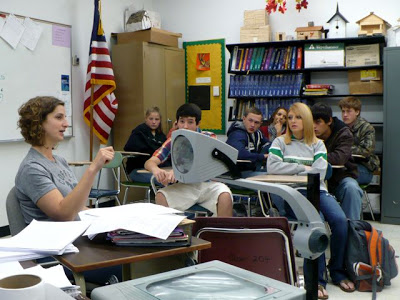Home Brew: Day 5
Today I switched gears to lead four back-to-back 90-minute sessions of high school English classes in Yancey County. I’d been looking forward to this experience for a number of reasons, most especially because a few of the students I saw were in middle school at Arthur Morgan School when my parents and I taught there a few years back. Those “kids” are now near adulthood, driving, and full of great promise. It was fun to see them in their high school worlds and to get to meet their current teachers.
[Mr. Bobbe caught in a moment of action—most indicative of his much-loved teaching style—as he and his students recite poetry for a warm-up drill to start each class. The poems are set to mundane melodies or clapping rhythms and the students enthusiastically sing/clap/recite along.]
Unlike my days with the elementary school students, today my job was to talk to high school students about what it’s like to be a living, working writer. I showed them my posters and papers that I hang on the wall for brainstorming, passed around my submissions log, read them a few rejection and acceptance letters, and talked about the different kinds of writing that I have to be able to do in order to make a sparse living. The students were especially amazed by this thing called “the slush pile” and the realities of how long a writer has to wait to hear back from editors, and how many different things a writer has going at any one given time.
After a Q&A session, they invited me to read a story or two. I read “Amplitude,” partly because it has a racy make-out scene between two teenagers that I knew would hold their interest long enough to—hopefully—instill the deeper meanings in the story. I also discussed cultural sensitivity in relation to writing from a different perspective than one’s own experience. For instance, how is it that a gringa like me can write from the perspective of an immigrant worker? How can a civilian female write from the perspective of a male Marine Corps member in combat?
Perhaps most poignant of all was the last class of the day, during which I read my story “Amputee” about a young female soldier who returns from Iraq after traumatic amputation of her arm from an IED. Moments before I read the story out loud, a student walked into class tardy and announced was late because he’d just been promoted in Junior ROTC to Private First Class. After I finished the story, another boy said, “Wait…are we at war in two countries? I thought we were only fighting in Afghanistan. We’re in Iraq?”
What does one say to the young man who shone with pride about his Junior ROTC promotion? “Congratulations?” “Listen well?” For a moment I froze, feeling the revolving door of history shifting one person’s life in a direction there might never be any coming back from. This young man proved to be the most fully engaged student in the class—actively listening, asking questions, and sharing his own opinions. As I gathered my things to leave it seemed there ought to be something I could say to him…something like Don’t do it or Be safe. Instead, I shook his hand, thanked him for his questions, and walked through the high school’s double doors out into the chilling mountain air.
Showing 2 comments




Katey, Last night Charlotte U. and I went to listen to Elizabeth Alexander speak about being a poet. Many of the things she said reminded me so much of you…you have to be a voracious reader, voracious in your life experiences but most of all a great listener. You are all of those! Karen
Whenever my students announced to me that they were signing up for the military, I flat-out, openly discouraged them. Part of me was a little fearful of what the parents' are my school's more pro-military reaction would be to *my* reaction, but I didn't care. I spoke my mind, and I'm glad I did. At least they knew I cared. And I am not completely anti-military. It's just that they were *my* students, and they were so fragile, so young, so alive. I didn't want to see them any other way.